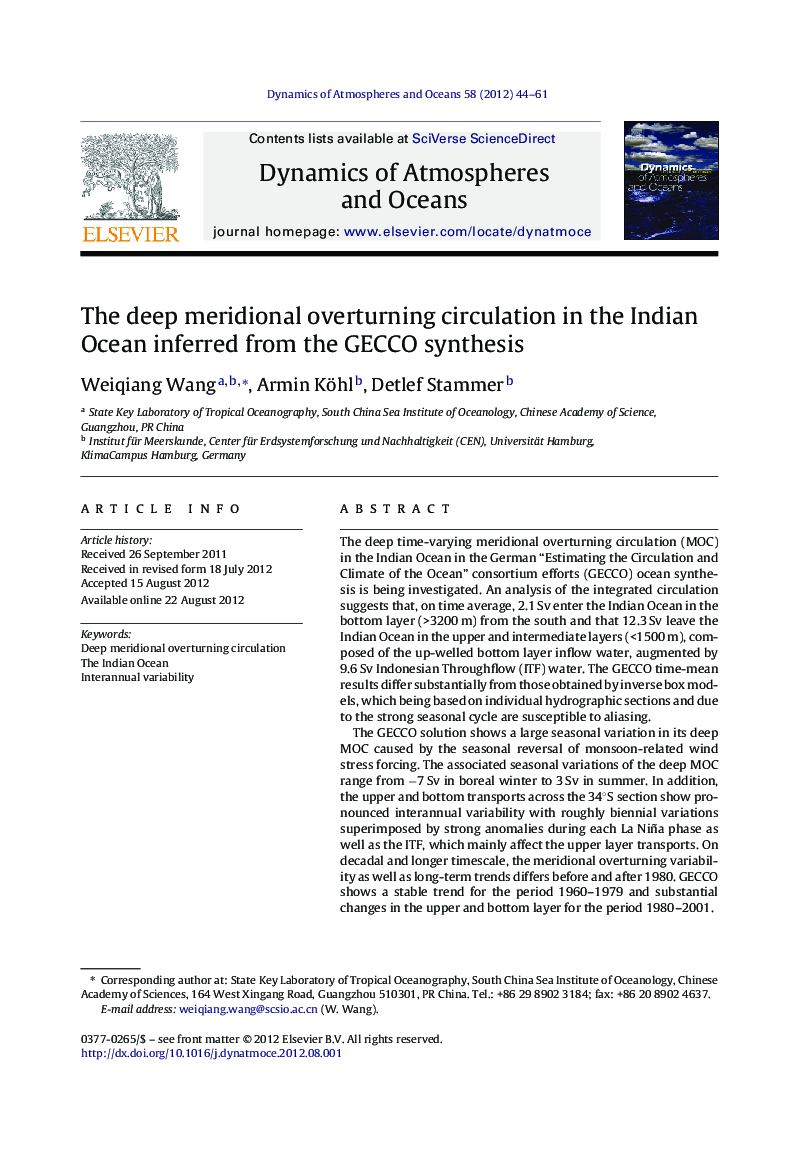| کد مقاله | کد نشریه | سال انتشار | مقاله انگلیسی | نسخه تمام متن |
|---|---|---|---|---|
| 6426551 | 1634231 | 2012 | 18 صفحه PDF | دانلود رایگان |

The deep time-varying meridional overturning circulation (MOC) in the Indian Ocean in the German “Estimating the Circulation and Climate of the Ocean” consortium efforts (GECCO) ocean synthesis is being investigated. An analysis of the integrated circulation suggests that, on time average, 2.1 Sv enter the Indian Ocean in the bottom layer (>3200 m) from the south and that 12.3 Sv leave the Indian Ocean in the upper and intermediate layers (<1500 m), composed of the up-welled bottom layer inflow water, augmented by 9.6 Sv Indonesian Throughflow (ITF) water. The GECCO time-mean results differ substantially from those obtained by inverse box models, which being based on individual hydrographic sections and due to the strong seasonal cycle are susceptible to aliasing.The GECCO solution shows a large seasonal variation in its deep MOC caused by the seasonal reversal of monsoon-related wind stress forcing. The associated seasonal variations of the deep MOC range from â7 Sv in boreal winter to 3 Sv in summer. In addition, the upper and bottom transports across the 34°S section show pronounced interannual variability with roughly biennial variations superimposed by strong anomalies during each La Niña phase as well as the ITF, which mainly affect the upper layer transports. On decadal and longer timescale, the meridional overturning variability as well as long-term trends differs before and after 1980. GECCO shows a stable trend for the period 1960-1979 and substantial changes in the upper and bottom layer for the period 1980-2001.By means of an extended EOF analysis, the importance of Ekman dynamics as driving forces of the deep MOC of the Indian Ocean on the interannual timescale is highlighted. The leading modes of the zonal and meridional wind stress favour a basin-wide meridional overturning mode via Ekman upwelling or downwelling mostly in the central and eastern Indian Ocean. Moreover, tropical zonal wind stress along the equator and alongshore wind stress off the Sumatra-Java coast contribute to the evolution of the Indian Ocean dipole (IOD) events.
⺠Time-mean and temporal variations of deep meridional overturning are investigated. ⺠Seasonal variations explain strength discrepancy between static and dynamic model. ⺠Ekman dynamics links deep overturning and upper ocean on the interannual timescale. ⺠The ITF is uncorrelated with deep meridional overturning variability.
Journal: Dynamics of Atmospheres and Oceans - Volume 58, November 2012, Pages 44-61